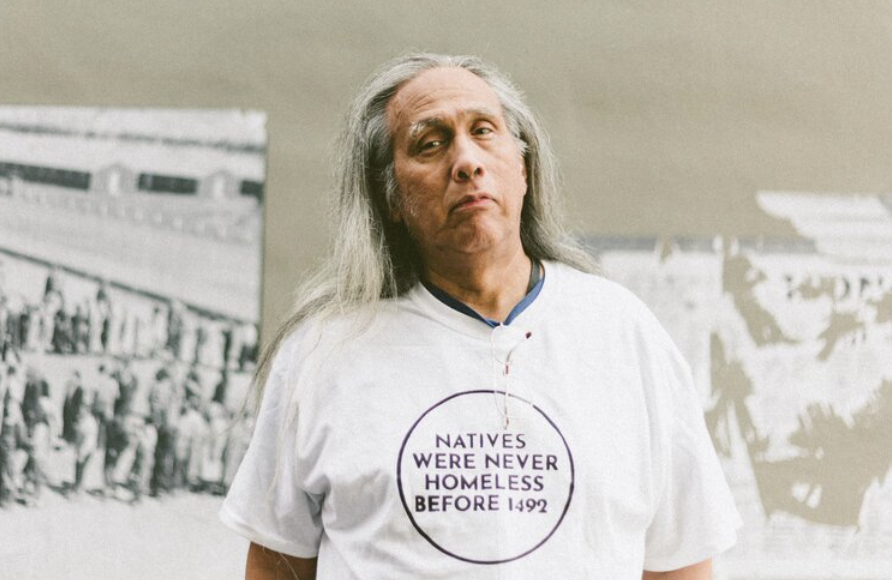
- Details
- By Jenna Kunze
Last month, the United States Supreme Court ruled that cities can ban people from sleeping and camping in public places in a decision Native advocates say will disproportionately impact Indigenous people. But in Seattle, Washington—a state with the sixth highest rate of unhoused people in the country—Native advocates say that the Indigenous population should remain protected by their organizations.
Derrick Belgarde (Confederated Tribes of Siletz Indians/ Chippewa-Cree) is the director of Chief Seattle Club, a housing and human service nonprofit in Seattle that is dedicated to serving the local Native populations.
Belgarde— who formerly experienced homelessness in Seattle before the Chief Seattle Club helped him get sober and began his journey towards healing and higher education— told Native News he doesn’t expect the Supreme Court decision to harm Seattle’s homeless population because of organizations like his, “but [in] surrounding cities and states, I think a lot of people are going to be harmed.”
Currently, Chief Seattle Club has 339 housing units, and provides food, primary health care, legal services, a Native art job training program, and opportunities for members to engage in cultural community-building.
“Our stance is this: We need safe spaces for people to go, not just enough beds, we also need safe, culturally-appropriate spaces,” Belgrade said. “If they opened up 10,000 shelter beds and not one of them is culturally-appropriate for Native people, they're not safe for Native people. You need to have spaces where people can go where they feel safer indoors than outdoors, and people don't realize that mental safety and security and calmness and sense of belonging is important for people.”
On June 28, the Supreme Court issued its 6-3 decision on Grants Pass v. Johnson, overturning a lower court ruling that deemed it unconstitutional to punish people for being homeless.
In a prior decision, the Ninth Circuit held that the Eighth Amendment’s Cruel and Unusual Punishments Clause bars cities from enforcing public-camping ordinances against homeless individuals whenever the number of homeless people in an area exceeds the number of available shelter beds, according to the decision.
By not upholding the lower court’s ruling, experts say, communities nationwide will more easily be able to fine, ticket or arrest people living unsheltered, even when there is no adequate shelter available.
This comes at a time when homelessness is on the rise; nationally, homelessness grew by 11 percent last year, and Native Americans are 7.5 times more likely to experience homelessness, according to Seattle Indian Health Board data.
Abigail Echo-Hawk (Pawnee Nation of Oklahoma), executive vice president for the Seattle Indian Health Board in King County, Washington, told Native News Online that the overrepresentation of Native Americans without housing is a direct result of the United States government forcibly relocating tribal nations, including her own, during the relocation era.
“There were large groups of American Indian and Alaska Native people who became homeless in these cities as a result of the attempted assimilation and genocide of Native people in this country,” Echo Hawk said. “Once coming to those cities, we saw and continue to see over-criminalization and targeting by local law enforcement of Native people. We see the impacts of that in the Missing and Murdered Indigenous People crisis, the high rates of sexual and physical violence against Native women, and the non-prosecution of that in urban areas across the United States.”
The decision means that cities aren't going to be responsible for providing shelter beds for their homeless, she said. That’s where organizations like the Seattle Indian Health Board and Chief Seattle Club step in with housing assistance services.
“Yes; there are cities in the United States where they have done good local efforts to combat the crisis of homelessness, but there are other places in this country that are outwardly racist, and people of color and American Indians and Alaska Natives are going to suffer.”
More Stories Like This
Native News Weekly (August 25, 2024): D.C. BriefsNavajo Nation Mourns the Passing of Former Vice President Rex Lee Jim
Deb Haaland Earns Endorsement From Communications Workers of America Local 7076
University Soccer Standout Leads by Example
Two Native Americans Named to Democratic Congressional Campaign Committee's“Red to Blue” Program
Help us defend tribal sovereignty.
At Native News Online, our mission is rooted in telling the stories that strengthen sovereignty and uplift Indigenous voices — not just at year’s end, but every single day.
Because of your generosity last year, we were able to keep our reporters on the ground in tribal communities, at national gatherings and in the halls of Congress — covering the issues that matter most to Indian Country: sovereignty, culture, education, health and economic opportunity.
That support sustained us through a tough year in 2025. Now, as we look to the year ahead, we need your help right now to ensure warrior journalism remains strong — reporting that defends tribal sovereignty, amplifies Native truth, and holds power accountable.
 The stakes couldn't be higher. Your support keeps Native voices heard, Native stories told and Native sovereignty defended.
The stakes couldn't be higher. Your support keeps Native voices heard, Native stories told and Native sovereignty defended.
Stand with Warrior Journalism today.
Levi Rickert (Potawatomi), Editor & Publisher


